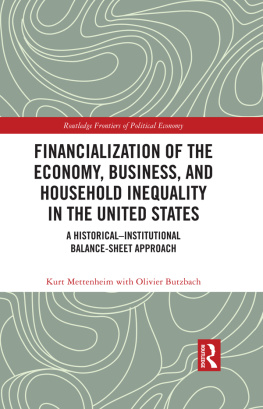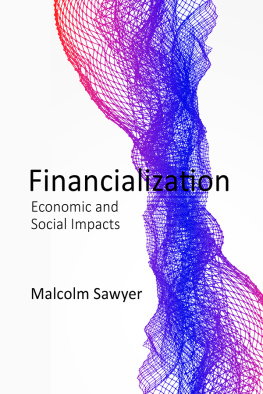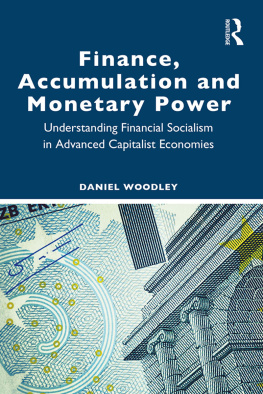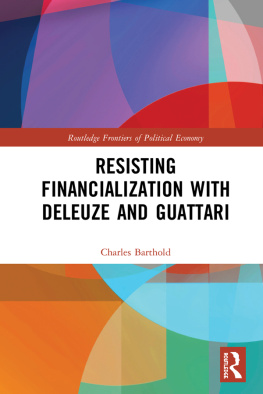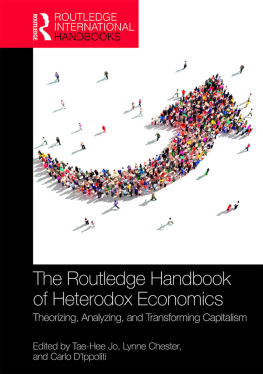Financialization of the Economy, Business, and Household Inequality in the United States
This second volume on the political and social economy of financialization in the US focuses on the consequences of the rise of finance for the American macroeconomy, household inequality, and the management of nonfinancial business enterprises.
A historicalinstitutional balance-sheet approach to long-term trends and recent change in the US reveals a series of anomalies and provisos for critical, heterodox, and mainstream economic approaches and provides new perspectives on debates about political economic change in advanced economies since the 20072008 financial crisis.
This book marks a significant contribution to the literature on financialization and studies in social economics, household economics, the structure and management of nonfinancial business enterprises, and American political economy.
Routledge Frontiers of Political Economy
Political Economy of Financialization in the United States
A Historical-Institutional Balance-Sheet Approach
Kurt Mettenheim
The International Political Economy of the Renminbi
Currency Internationalization and Reactive Currency Statecraft
Hyoung-kyu Chey
Explaining Wealth Inequality
Property, Possession and Policy Reform
Benedict Atkinson
Financialization of the Economy, Business, and Household Inequality in the United States
A HistoricalInstitutional Balance-Sheet Approach
Kurt Mettenheim with Olivier Butzbach
Economic Ideas, Policy and National Culture
A Comparison of Three Market Economies
Edited by Eelke de Jong
Political Economy of Contemporary Italy
The Economic Crisis and State Intervention
Nicol Giangrande
For more information about this series, please visit: www.routledge.com/Routledge-Frontiers-of-Political-Economy/book-series/SE0345
Financialization of the Economy, Business, and Household Inequality in the United States
A HistoricalInstitutional Balance-Sheet Approach
Kurt Mettenheim
with Olivier Butzbach

First published 2022
by Routledge
2 Park Square, Milton Park, Abingdon, Oxon OX14 4RN
and by Routledge
605 Third Avenue, New York, NY 10158
Routledge is an imprint of the Taylor & Francis Group, an informa business
2022 Kurt Mettenheim and Olivier Butzbach
The right of Kurt Mettenheim and Olivier Butzbach to be identified as authors of this work has been asserted by them in accordance with sections 77 and 78 of the Copyright, Designs and Patents Act 1988.
All rights reserved. No part of this book may be reprinted or reproduced or utilised in any form or by any electronic, mechanical, or other means, now known or hereafter invented, including photocopying and recording, or in any information storage or retrieval system, without permission in writing from the publishers.
Trademark notice: Product or corporate names may be trademarks or registered trademarks, and are used only for identification and explanation without intent to infringe.
British Library Cataloguing-in-Publication Data
A catalogue record for this book is available from the British Library
Library of Congress Cataloging-in-Publication Data
Names: Mettenheim, Kurt von, 1957 author. | Butzbach, Olivier, author.
Title: Financialization of the economy, business, and household
inequality in the United States : a historical-institutional balance-sheet
approach / Kurt Mettenheim, with Olivier Butzbach.
Description: Abingdon, Oxon ; New York, NY : Routledge, 2022. |
Series: Routledge frontiers of political economy |
Includes bibliographical references and index.
Identifiers: LCCN 2021024287 (print) | LCCN 2021024288 (ebook)
Subjects: LCSH: FinancializationUnited StatesHistory. | Economic
developmentUnited StatesHistory. | Income distribution
United StatesHistory. | United StatesEconomic conditions.
Classification: LCC HG181 .M478 2022 (print) |
LCC HG181 (ebook) | DDC 332.04150973dc23
LC record available at https://lccn.loc.gov/2021024287
LC ebook record available at https://lccn.loc.gov/2021024288
ISBN: 978-1-032-12151-2 (hbk)
ISBN: 978-1-032-12154-3 (pbk)
ISBN: 978-1-003-22332-0 (ebk)
DOI: 10.4324/9781003223320
Typeset in Bembo
by Newgen Publishing UK
Contents
Olivier Butzbach
DOI: 10.4324/9781003223320-1
This book is the second volume of a political-economic, historicalinstitutional, and balance-sheet inquiry into financialization in the United States. The preceding volume presented the theories and concepts of modern pluralist and critical political economy, the techniques of historicalinstitutional analysis, and the fundamentals of social sector financial portfolios and balance sheets. Conceptual stretching, mis-aggregation, double-counting, loading on the dependent variable, and private sector biases were found to flaw economic approaches to bank change and the rise of finance ().
The recovery of the original concepts behind US national income accounts enabled the elaboration of alternative approaches to the long-term origins, the changing character, and the limits to the rise of finance. The theory of compounding financialization, and the evidence from the US, suggested that the rise of finance occurred far earlier than assumed in critical political-economy research. Post-Keynesian endogenous money theory ( and liabilities. However, the conceptual stretching of money to include financial claims, the shift away from the private production to the public accommodation of financial claims and liabilities, and the redefinition of banks as financial firms along the lines of contemporary banking theory and financial intermediation theory require revision of endogenous money approaches. Moreover, the evidence from the US since the financial crisis of 20072008 indicates both limits to the ascendence of finance and the expansion of the scope of conflict over monetary policy and authority.
To explain these anomalies of longer-term origins, public accommodation, and the limits to the rise of finance in the US, the preceding volume returned to the founding ideas of modern political and social economy, especially as elaborated by Karl Polanyi and E.P. Thompson. The rise and fall of finance in the US are consistent with Karl Polanyis conception of the two political-economic moments that shaped the origin of our times (). According to Polanyi, the first political-economic moment that shaped modern capitalism was the imposition of laissez-faire policies to create markets for land, labor, and money during the 1830s in England. The second moment, decades later, was the emergence of social reactions of self-defense against the social exclusion, inequalities, and market failures produced by the commodification of land, labor, and money. Polanyis framework of two moments is especially helpful to explain both the origins of, and limits to, financialization. It is consistent both with theories from critical political economy of the origins of financialization in the late 1970s and, decades later, the emergence of social reactions of self-defense against the commodification of credit, finance, and banking in the US.

